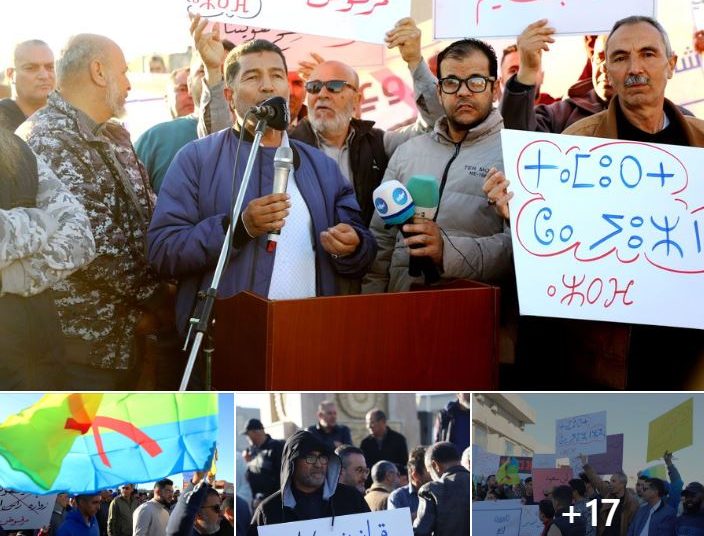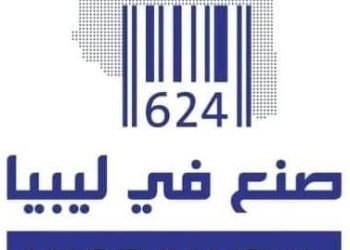The people of the Municipality of Zuwara say they categorically reject Law No. 14 of 2010 regarding the Zuwara-Ras Ajdir free zone area development project, and demand the government stop all executive procedures.
The sentiment was expressed during a demonstration in Zuwara on Monday. On Tuesday, Zuwara Municipality Mayor Hafed Ben Sassi met with the leaders of the demonstrations.
During the meeting, the mayor confirmed the Municipal Council’s ‘‘commitment to continuing to demand the suspension of all executive procedures for this project and to ask parliament to cancel it’’.
He stressed that the Municipal Council ‘‘strongly supports this movement, stressing its full support for it, calling on all the people to show solidarity and unify the word and class to cut off the road in front of the brokers who seek to eliminate our land, our identity, our culture and our existence.’’
Speaking live on a Libyan TV station on Tuesday, Ben Sassi said the project has no local support. He said it is a cover by interested parties to access state funds no more or less. He added that the money could be better spent on real local needs.
He pointed out that Zuwara still has regular power and water cuts and therefore the money should be spent on basic infrastructure needs.
No local representation or accountability
He said the Qaddafi-era project and its law was tailored for one of Qaddafi’s sons. The project’s laws are independent from the local area and its Tripoli-selected board of directors and chairman enjoy total power within the development zone. They are unelected, undemocratic and unaccountable to the region.
This would, he claimed, suppress and override the local culture, identity and customs as the project does not, for example recognize the Tamazigh language, but recognizes Arabic and other foreign languages.
The mayor added that the project was not approved by the Ministry of Economy and Trade and that the current Tripoli government are aware of Zuwara’s objection to it.
He concluded by saying that the project needs local approval, including by the objecting land owners whose lands will be forcibly sequestrated – which it does not have. He therefore concluded that ‘‘the project will never take off’’.
Analysis: Alcohol, bikinis, money and control?
It must be noted that Zuwara Municipality seems to have done a complete 180 degree turn on the subject. In June 2021, Libya Herald had reported Zuwara Municipality holding a consultative session to discuss the Free Zone project.
The session had discussed the latest developments on the project and the decision to assign a founding committee to it. The session had heard views, opinions and consultations on the negatives and positives and the effects that the project may cause and the desired results from it.
During the session, it was agreed to intensify efforts and work in a common direction and to call for more meetings for all segments of society and to expand the base of participation in these meetings and the role of civil sectors and institutions in working with the Zuwara municipality in this file.
It was revealed that the Mayor of Zuwara had recently met the Minister of Economy and Trade Mohamed Hwej and discussed with him the ‘‘special nature’’ of the free zone and the possibility of activating the (Qaddafi-era) law issued in this regard.
It was also revealed that the Zuwara Mayor had requested from the Economy and Trade Minister to make a presentation of the Free Zone project to show the Municipality’s civil societies and the general public – which the Minister had agreed would be prepared in the coming days.
Libya’s Free Zone laws – background
It will be recalled that the law for the Zuwara Free Zone was issued during the Qaddafi regime.
The Free Trade Act of 1999 created a legal framework for establishing offshore free trade zones in Libya. The Libyan General People’s Committee’s Law (168) of year 2006 established the Libyan Free Zones Board to supervise and run all the intended Libyan free trade zones. Law (215) of 2006 established the Zuwara-Abu-Kammash Free Trade Zone and Law (32) of year 2006 established the Misrata Free Trade Zone.
‘‘Special nature’’ of the free zone
It must also be kept in mind that at the time (2006) of the publication of the Zuwara Free Zone law, the ‘‘special nature’’ of the zone was widely understood to mean that the Free Zone would be allowed to sell alcohol – even though it was never specifically mentioned. The ‘‘special nature’’ of the zone also implied a relaxed dress mode for tourists, probably including the wearing of bikini swimwear.
The Saadi Qaddafi connection
At the time, the Free Trade Zone entity was headed by one of Qaddafi’s sons, Saadi, and was to include a Libyan-Tunisian tourism area on the border area. Work started on a 60 by 30 kilometre stretch of land along the Mediterranean coast between Zuwara and the island of Farwa close to the Tunisian border.
The UAE connection?
There had also been an announcement at the time that the project was assigned to Dubai’s construction giant, Emaar Properties, which had started on master-plan proposals.
The project, however, ran into difficulties, initially with locals who resisted the state’s attempt to confiscate their land, then as with all construction projects, by the 17 February 2011 revolution.
Multiple objections
Analysts and observers say there are different groups opposing the project for different reasons which have now united.
Alcohol and bikinis
There are the conservative elements who object to the idea of alcohol being consumed in their back yards and foreign female swimmers splashing around in their bikinis.
Money
Then there are the landowners who are objecting to the forceful sequestration of their lands to build the project. Some just do not want to be forced to sell their land. Others want to sell but at a much higher price, while the more entrepreneurial want to use their land to establish their own tourism projects out of which they think they can make much more money.
Power and control
The wide group that objects to the project on the basis of it being controlled by the Tripoli government want much more – if not total – local control. They want the region to be in control of the project and most of its revenue to benefit the locality.
They couch their objections in cultural and linguistic terms using Amazigh language and culture to object to having no control over the multi-billion project. They look at Misrata Free Zone, Misrata Port and the Misrata-based Libyan Iron and Steel Company and see it is controlled by the people of Misrata. They want a similar set up that reflects power, money and patronage on the locality – not the capital Tripoli.
Cultural control – fear of Arabisation
Some Amazigh fear that Qaddafi had instigated the project specifically to Arabise the area through the influx of many non-Amazighs. They fear this would dilute their heritage and culture.
Zuwara Municipality discusses establishment of free zone (libyaherald.com)
Forum discusses establishment of Zawia investment port and free zone (libyaherald.com)
Sebha wants free trade zone (libyaherald.com)
Government looks at new eastern free trade zone (libyaherald.com)










